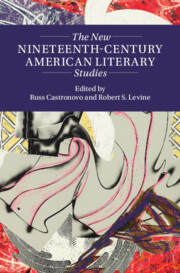Book contents
- The New Nineteenth-Century American Literary Studies
- Twenty-First-Century Critical Revisions
- The New Nineteenth-Century American Literary Studies
- Copyright page
- Contents
- Notes on Contributors
- Acknowledgments
- Introduction
- Chapter 1 Harriet Wilson’s Lessons
- Chapter 2 Frances Ellen Watkins Harper and the New Civil War Literary Studies
- Chapter 3 The Global South
- Chapter 4 Making It New
- Chapter 5 Law, Nineteenth-Century American Literary Studies, and the Black Formalist Tradition
- Chapter 6 Conjuring Nineteenth-Century Black Environmentalism
- Chapter 7 Transitioning Queer Studies in Nineteenth-Century American Literature
- Chapter 8 New Materialisms and Scalar Collapse in Nineteenth-Century American Literary Studies
- Chapter 9 Nineteenth-Century Spanish-Language Textbooks and US American Literature
- Chapter 10 The Political Functions of Reconstruction Literature, Then and Now
- Chapter 11 Echoes from the Past, Archives of the Future
- Chapter 12 Beyond the Secularization Thesis
- Chapter 13 A Periodical Masquerade
- Chapter 14 Tasteful Sketches and Tasteless Ambition
- Chapter 15 Grounding Nineteenth-Century Studies in Indigenous Studies
- Chapter 16 Cultures of Data
- Chapter 17 Rethinking Critical Geographies
- Chapter 18 Rethinking Black Speculative Fiction
- Chapter 19 The Black Pacific
- Chapter 20 “Unfeeling Stone”
- Index
Chapter 1 - Harriet Wilson’s Lessons
Disability and Nineteenth-Century American Literature
Published online by Cambridge University Press: 02 January 2025
- The New Nineteenth-Century American Literary Studies
- Twenty-First-Century Critical Revisions
- The New Nineteenth-Century American Literary Studies
- Copyright page
- Contents
- Notes on Contributors
- Acknowledgments
- Introduction
- Chapter 1 Harriet Wilson’s Lessons
- Chapter 2 Frances Ellen Watkins Harper and the New Civil War Literary Studies
- Chapter 3 The Global South
- Chapter 4 Making It New
- Chapter 5 Law, Nineteenth-Century American Literary Studies, and the Black Formalist Tradition
- Chapter 6 Conjuring Nineteenth-Century Black Environmentalism
- Chapter 7 Transitioning Queer Studies in Nineteenth-Century American Literature
- Chapter 8 New Materialisms and Scalar Collapse in Nineteenth-Century American Literary Studies
- Chapter 9 Nineteenth-Century Spanish-Language Textbooks and US American Literature
- Chapter 10 The Political Functions of Reconstruction Literature, Then and Now
- Chapter 11 Echoes from the Past, Archives of the Future
- Chapter 12 Beyond the Secularization Thesis
- Chapter 13 A Periodical Masquerade
- Chapter 14 Tasteful Sketches and Tasteless Ambition
- Chapter 15 Grounding Nineteenth-Century Studies in Indigenous Studies
- Chapter 16 Cultures of Data
- Chapter 17 Rethinking Critical Geographies
- Chapter 18 Rethinking Black Speculative Fiction
- Chapter 19 The Black Pacific
- Chapter 20 “Unfeeling Stone”
- Index
Summary
In the last ten years, as nineteenth-century Americanists have turned their attention to disability as an analytical category for their own field, they have used and developed new tools and modes of analysis to map a much more complex disability landscape. In this chapter, I turn to Harriet Wilson’s Our Nig (1859) to ask what a fictionalized autobiography written from the experience of a disabled Black woman can show us about the complexity and limitations of our critical understandings of disability in the period. Whereas we have been trained to look for disability in nineteenth-century American literature as represented flatly and relegated to the margins, Wilson keeps disability at the center of her narrative. Such a reading employs the method of historical cripistemology – that is, it begins from the experiences and knowledge of disabled people in the past – here, Harriet Wilson’s – to reframe our understanding of literature and culture. In Our Nig, Wilson uses her own experience to break with familiar Black and white forms for narrating disability in the antebellum period. Taking up Our Nig from this perspective demonstrates how careful attention to disability in nineteenth-century American literature and culture – particularly literature written by disabled people – can help us recover the broader scope and greater variety of disability representation in the period, as well as its import for helping us reenvision how we read literature in the period more broadly.
Keywords
- Type
- Chapter
- Information
- The New Nineteenth-Century American Literary Studies , pp. 9 - 23Publisher: Cambridge University PressPrint publication year: 2025

